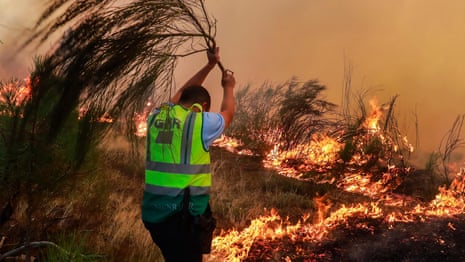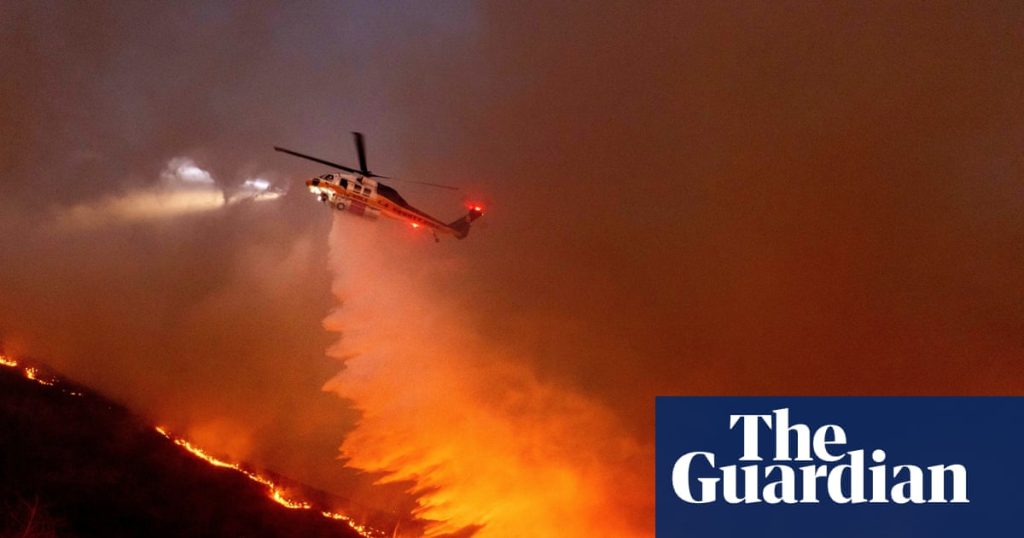Wildfires tore through central Chile last year, killing 133 people. In California, 18,000 buildings were destroyed in 2018 causing US$16bn (A$24bn, £12bn) in damage. Portugal, Greece, Algeria and Australia have all felt the grief and the economic pain in recent years.
As the headlines, the death tolls and the billion dollar losses from wildfires have stacked up around the world, so too have the rising temperatures – fuelled by the climate crisis – that create tinderbox conditions.
For the first time scientists say they have shown unambiguously that the numbers of “societally disastrous” wildfires – the ones that hit economies hard and take lives – have increased around the world as global heating bites.
“We’re witnessing a fundamental shift in how wildfires impact society,” said Australian scientist Dr Calum Cunningham, who led research published in the journal Science. “Climate change sets the stage for these disasters.”
Looking at the 200 costliest fires between 1980 and 2023 – pulled from a private database maintained by global re-insurer Munich Re – the trends were clear.
Of the 200 most damaging fires since 1980 – that is, the fires with the highest direct costs relative to each nation’s GDP – 43% happened in the last 10 years.
Half of the fires that cost US$1bn or more were also in the last 10 years. Over the 44 years analysed, the frequency of fires causing 10 or more deaths tripled while the population only went up by 1.8 times.
Temperatures and the dryness of the atmosphere and of the vegetation – all factors promoting fires – all got significantly worse between 1980 and 2023.
Half the wildfires happened while local weather conditions were in the worst 0.1% on record for fire danger.
Disturbing regularity
Many studies have found the weather conditions that promote fires around the world are getting worse, and happening more often, because of global heating.
But the last major study that looked globally at the cost of those wildfires and the deaths related to them was in 2016 and found no trends.
The period since then had been “punctuated by major fire disasters with disturbing regularity,” the authors said.
“We went looking for that study showing things were getting worse. We felt intuitively that they were, but there was no research,” said Cunningham, of the University of Tasmania’s Fire Centre.
“Climate sceptics have seized on that gap, so we hope this puts to bed the idea it’s not getting worse. Things are getting worse.
“It is unambiguous and it is clear climate change is playing a role. These aren’t just bigger fires, they’re fires occurring under increasingly extreme weather conditions that make them unstoppable.”
He said the results point to the need to cut greenhouse gas emissions quickly, but to also better manage forests close to populations. The public could help by doing maintenance to stop embers getting inside buildings and clearing fuels like leaves.
Other unquantified influences that may be contributing to the worsening trend included the numbers of people living close to forests and the abandonment of agricultural areas.
The authors said the trends came despite “ballooning expenditure on fire suppression” – US federal spending on fire suppression, for example, more than tripled between 1985 and 2022.
“This expenditure is likely limiting (or masking) the fire crisis, but not offsetting it,” they wrote.

The number of deaths from fires was likely a gross underestimate. One database recorded 19 direct deaths from fires in Indonesia in 2015, but the resulting air pollution was implicated in about 100,000 premature deaths from respiratory problems.
Roadmap to catastrophic disaster
When the researchers looked at areas with a high risk of fires close to populations, they found this deadly combination on 10% of the planet’s land surface.
Those areas included January’s fires in Los Angeles, with direct losses estimated at US$65bn – “likely the costliest fire disaster in history” – and the 2024 fires in Valparaíso, Chile, that claimed 135 lives.
Both those disasters happened after the data analysis was completed, suggesting the methods were able to predict places at risk.
“This provides a roadmap for where the next catastrophic disasters are most likely to occur,” said Bowman.
Dr Hamish Clarke, an expert on fires and climate change at the University of Melbourne not involved in the study, said: “This is an important new paper that puts some hard numbers on a much discussed topic – global trends in, and drivers, of socially and economically damaging fires.
“Unfortunately the news is not good – fires are killing more people and imposing more costs on economies around the world.”

